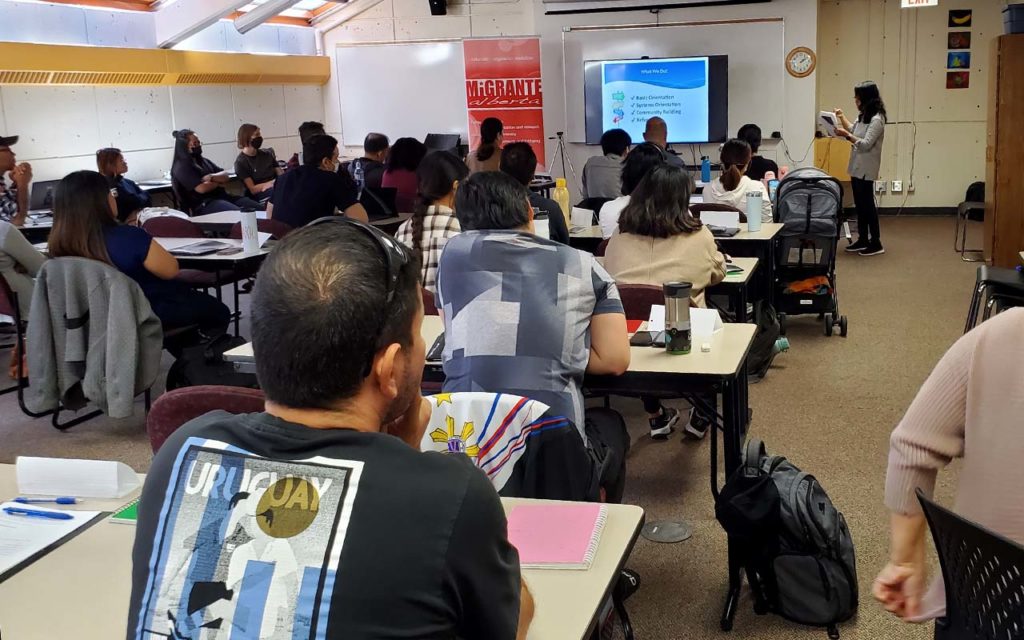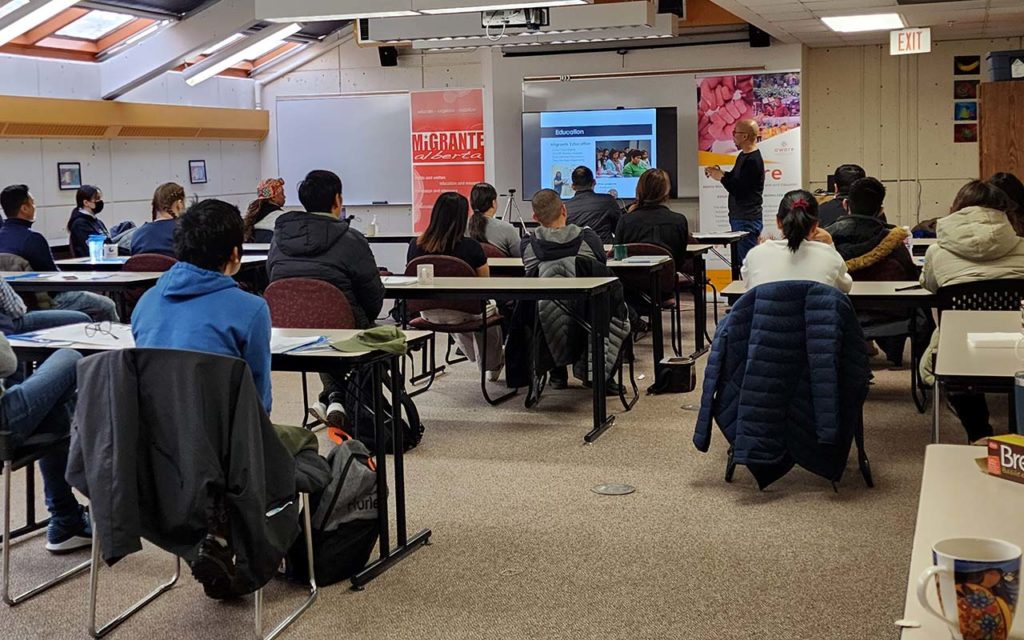Cynthia Palmaria was born and raised in the Philippines. Her parents joined the first stream of temporary foreign workers (TFWs) who came to Canada in the 1970s as domestic workers, and they found work in Montreal. She was 18 before she was able to join them in Canada. In the attached transcript, Palmaria outlines the work her parents did in Montreal, the challenges and abuses they faced, and the repercussions of their being in Canada for both family members who left, and those who stayed in the Philippines.
Once in Montreal, Cynthia Palmaria studied to become a radiation therapist, working in Quebec and Toronto, and eventually Edmonton where she came with her own family in 2013, and she is a faculty member in Radiation Therapy at the University of Alberta.
In Edmonton, the family settled in the Jasper Place area. In video clip #1 she explains why they chose to live here among other Filipinos – many of whom are TFWs in the Caregiver Program who work at Misericordia or in long-term care homes here – who settle in the area for various reasons – Catholic churches and schools, Filipino shops, and access to a community and to support systems.
She also speaks about being an “Ate” to many community members:
In Filipino culture we do have terms that we use for different family members, although community members would use that even if there’s no blood relation. Ate, which means “big sister,” is what a lot of the community members would use when they talk to me. They would say, “Ate Cynthia, can you help me with this?” or, “Ate Cynthia, I have this problem with my work.” So it’s always “Ate.” When we’re with the younger members of the community, say, when we’re having workshops with… like, my daughter’s having a workshop with the young members of the community here, I’m surrounded by these young Filipino women. They would say, “Tita,” which is like an auntie. I’m a tita, I’m an auntie, and so that’s something that you would commonly hear. I guess part of it is respect but also, even if we’re not blood related, that’s something that brings us closer like a family. That’s something that we have in the community.
When Cynthia Palmaria and her husband moved here, they founded a group called Migrante Alberta to serve as community organizers and to meet the needs of community members. Their first campaign successfully created a consular office in Alberta in Calgary for Filipino citizens who previously had to travel to Vancouver by their own means to obtain visas and renew passports.
In video clip #2, Palmaria describes another program centred around language learning that Migrante Alberta offers at the Orange Hub for people wanting to apply for permanent residency.


We asked Palmaria to expand on the role that women in the Caregiver Program play in providing long-term care in Alberta and the challenges they faced during COVID. She does so in video clip #3, and describes the various streams of the Temporary Foreign Workers Program, past and present1. She explains how those in the various streams can become undocumented, and the consequences they then face. She also talks about the groups and organizations2 that Migrante Alberta works with to defend migrant workers to obtain permanent residency status for undocumented workers and for regularization.
One such campaign for permanent residency focused on a Jasper Place resident: “Let Danilo De Leon Stay in Canada”3. These organizations also campaigned to let Evangeline (Vangie) Cayanan and her Canadian-born daughter, McKenna Rose4 stay in Canada5. In video clip #4, Palmaria describes the campaign for McKenna Rose to access medical care, and explains how undocumented workers who are parents of Canadian-born children also face issues of not being able to access benefits or education for their children. She also describes how Danilo de Leon and Vangie Cayanan, who became the faces of the regularization programs, inspired other undocumented workers to come forward, and how that inspires her as a community organizer.
In the interview, Cynthia Palmaria also talks about many global realities affecting the migrant workers that she works with: the role of immigration brokers; why Filipinos are forced to seek work abroad; Canadian and Australian mining companies extracting natural resources in the Philippines and driving Indigenous populations from those areas into the cities; the “push factor” from the Philippines, and the “pull factor” from Canada; how Canada benefits from having “highly trained professionals filling the labour needs of Canada”; and observations about the shortage of healthcare workers in Alberta, and discrepancies in hiring practices of nurses trained in the Philippines. A theme that recurs throughout the interview is the repercussions of TFWs and undocumented workers being “legislated in the low wage industry,” thereby needing to work two or three jobs at a time, all the while having to “send the remittance money back to their family in the Philippines.”
For More Information:
1For more about the Temporary Foreign Workers Program and to access interviews with workers and their allies, visit the Alberta Labour History Institute’s page on Temporary Foreign Workers, and Migrante Alberta.
Two recent articles describe the current TFW Program:
Jeremy Appel, “A UN report slammed the predatory practices of Canada’s TFW program. Some of the worst abuses of this “breeding ground” for modern slavery are here in Alberta,” Progress Report, October 12, 2023.
Armine Yalnizyan, “Canada’s Temporary Foreign Worker program is ballooning – creating a new class of wage slaves from abroad,” Toronto Star, October 12, 2023.
2For example, Migrante Canada and Migrant Rights Network. More about Migrante Alberta’s work with these groups, as well as with unions and community organizations across the country can be found in the transcript.
3The campaign “Let Danilo de Leon Stay” was successful, and he now has permanent residency in Canada.
4See also Evangeline Cayanan at the Alberta Labour History Institute.
5That campaign was also a success; read the report by Migrante Alberta here.
.


